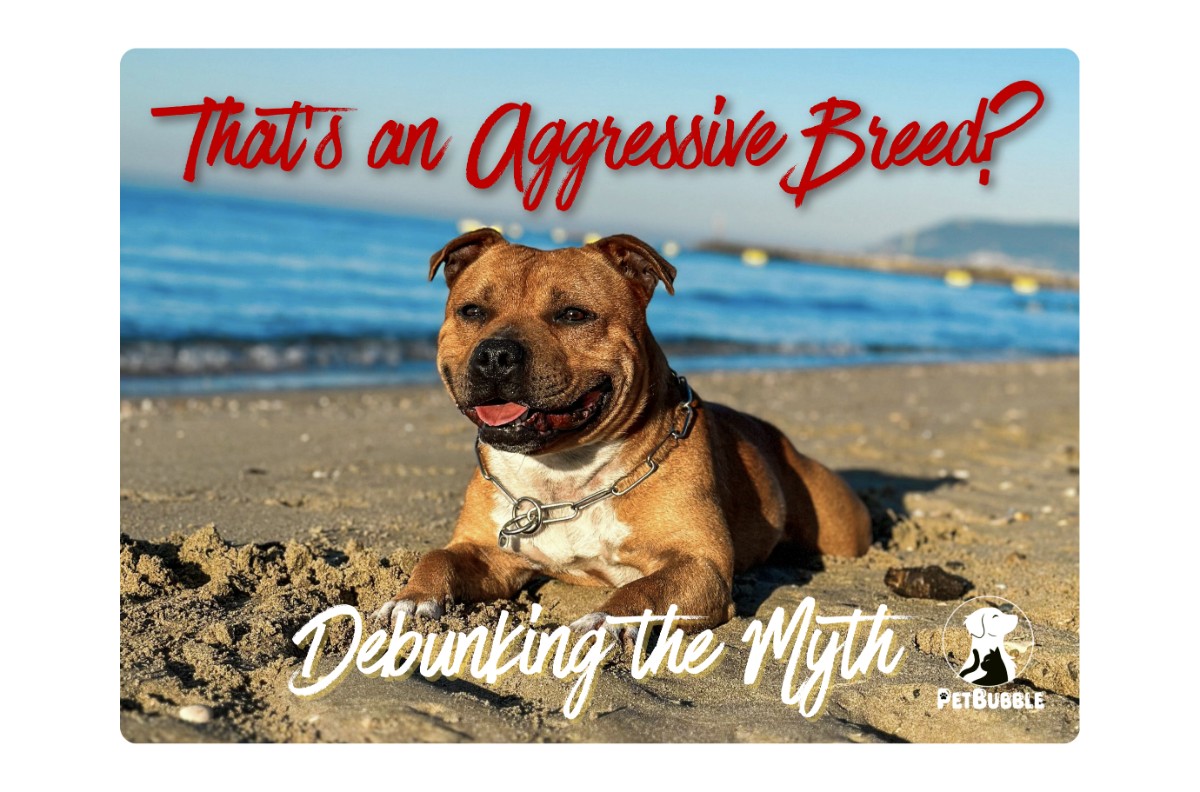Debunking the Myth
Wednesday, 08 October 2025

Debunking the Myth That
Breed Predicts Aggression
Many people believe certain dog breeds are inherently aggressive, but research increasingly shows this is a misconception. While breed may influence general tendencies, it is far from the only, or strongest, predictor of aggressive behaviour.
Although domestic dogs descend from wolves, which have a higher natural propensity for aggressive behaviour, many generations of selective breeding have resulted in the calmer, more sociable dogs we know today. Aggression is a complex trait influenced by multiple genetic and environmental factors, including maternal effects, sex, age, neuter status, litter size, guardian (e.g. pet-parent) personality, and their interactions.
As a veterinarian, I’m constantly reminded how unpredictable animals can be. In my experience a well-socialised dog tends to have better mental health than one that missed pivotal experiences as a puppy or exposed to life-changing trauma. I often meet siblings who have had the same parents, same beginning to life, same guardianship and environment, and still, one individual will be calm with no aggressivity noted at all, while it's sibling will be highly anxious and needs to be muzzled. These can be breeds from Dachshunds, Schnauzers, or Cavoodles to Amstaffs, Kelpies, or Labradors. It highlights to me that there are so many factors that influence behaviour, and this example anecdotally confirms that breed genetics only plays a small role. Interestingly, the same Nature versus Nurture debate we see in humans applies to dogs (and other animals) as well.
Attacks are more strongly influenced by socialisation, training, environment, health, and guardian behaviour than by breed alone.
Australian Veterinary Association

EXAMPLE 1.
Breed: Amstaff X
Temperament: Gentle, sociable, friendly
Aggressivity? None noted since day one of being in care at the vet clinic
Known history: Abandoned, emaciated, shy. Placed in council holding facility, socialised at a veterinary clinic, took months-and-months to rehome but eventually they both found loving homes.
Are Amstaffs an aggressive breed? No
Can individual Amstaffs be aggressive? Yes
Placing rigid restrictions on specific breeds is both scientifically flawed and ethically questionable. Behavioural science confirms: aggression is multi-factorial. Breed identification is often unreliable (even with current DNA testing), and breed has been shown to account for only 10-40% of behavioural variation. Prejudice, or “breedism”, has no place in a animal-loving community built on support, love, and inclusion.
In Australia, animal welfare bodies like the RSPCA (The Royal Society for the Prevention of Cruelty to Animals) argue that breed-specific legislation is based on confounding assumptions: that certain breeds are inherently dangerous and that appearance reliably predicts risk. Temperament tests consistently show that “restricted breeds” do not differ significantly in behaviour from other dogs. The RSPCA maintains that each dog should be assessed individually, rather than judged by breed.
Similarly, the Australian Veterinary Association critiques breed bans in its report Dangerous Dogs - A Sensible Solution, noting that such bans rarely reduce dog attacks. Instead, attacks are more strongly influenced by socialisation, training, environment, health, and guardian behaviour than by breed alone. For example, New South Wales statistics show American Staffordshire Terriers (Amstaffs) appear most often in dog attack reports, but breed identification was frequently unreliable, deliberately misleading or not reported at all. This data lacked breed verification and any commentary regarding other influencing factors like environment, individual dog temperament, pet parent behaviour and their dog's neuter status.

EXAMPLE 2.
Breed: Sproodle - Poodle X Springer Spaniel
Temperament: Gentle, sociable, friendly but can be anxious in new environments
Aggressivity? Some noted towards individual dogs (rare but has happened) and unpredictable. This has lead to him growling, launching and snapping at them. I personally do not trust him with all dogs even though he has never actually bitten. He has given warning signs and care must always be taken.
Known history: Bought from registered breeder, weened at appropriate age, very well socialised with humans, veterinary clinic environment and dogs.
Biases: He's the sweetest fur-nephew one can have.
Are Poodles or Springer Spaniels aggressive breeds? No
Can individual Poodles or Springer Spaniels be aggressive? Yes
Decisions based solely on breed can result in prejudice, exclusion and unnecessary euthanasia, leaving genuinely dangerous dogs unidentified in our community. Cross-breeds and mixed ancestry further complicate the picture, and relying on appearance alone risks overlooking or misjudging a dog’s behaviour.
What This Means for Pet Parents
Don’t assume aggression, or passivity, based on assumed breed alone.
Prioritise socialisation, positive training, predictable environments, and attentive care.
When choosing a dog, consider temperament, history, energy levels, and household fit over breed.
Support evidence-based policies over breed bans, education campaigns, responsible breeding, good guardian behaviour, leash laws, and safe containment are far more effective.
If your dog shows aggression, it often stems from fear, stress, defensive or protective instinct. As a pet parent or pet guardian, it’s your responsibility to understand your dog’s limitations and ensure environments are safe and suitable for them. Do not place this burden of responsibility on others.

EXAMPLE 3.
Breed: Greyhound (example not based on the one pictured)
Temperament: Anxious, timid, fearful
Aggressivity? Some noted towards individual dogs. He was unpredictable but generally growling, launching and snapped at a dog that came close to him too quickly. I did not trust him with any dogs. Care must always be taken.
Known history: Greyhound racing can be tough, and many dogs emerge with trauma that can lead to anxiety, fear, or fear-based aggression. Without such experiences, they're known to be gentle, calm, and endearingly goofy. In stressful situations, past trauma can trigger hypervigilance, making aggression their only perceived defence.
Are Greyhounds an aggressive breed? No
Can individual Greyhounds be aggressive? Yes

Dogs love being playful, and it’s our responsibility to safeguard their
mental and physical wellbeing in every interaction. Let them have fun, just never at the expense of others.
References
Australian Veterinary Association (AVA) (n.d.) Dangerous Dogs – A Sensible Solution. [online] Australian Veterinary Association. Available at: https://www.ava.com.au
AnimalEthics@KU (2025) Behavioural genetic analysis on dogs. [online] University of Copenhagen. Available at: https://animalethics.ku.dk
BioRxiv (2019) Genomic analysis of dog behaviour traits across breeds. [online preprint] Available at: https://www.biorxiv.org
Bonner, K. (2019) A review of recent research into canine aggression behaviour. [online] The University of Sydney, Animal Welfare Science Essays. Available at: animalwelfarescienceessays.sydney.edu.au
Companion Animal Network Australia (2022) Restricted breeds and breed-specific legislation. [online] Available at: https://australiacan.org.au
Ilska, J., Haskell, M.J., Blott, S.C., Sanchez-Molano, E., Polgar, Z., Lofgren, S.E., Clements, D.N. and Wiener, P. (2017) ‘Genetic characterization of dog personality traits’, Genetics, 206(2), pp.1101–1111. [online] Available at: https://academic.oup.com/genetics
MacLean, E.L. and vonHoldt, B.M. (2019) ‘Dog behaviour and genetics study reveals breed only explains small part of behaviour differences’, ScienceDaily, 8 October. [online] Available at: https://www.sciencedaily.com
MacLean, E.L., Snyder-Mackler, N., vonHoldt, B.M. and Serpell, J.A. (2019) ‘Highly heritable and functionally relevant breed differences in dog behaviour’, Proceedings of the Royal Society B: Biological Sciences, 286(1912), 20190716. [online] Available at: https://doi.org/10.1098/rspb.2019.0716
MDPI (2024) ‘Genetic and gene-by-environment influences on aggressiveness in dogs’, Animals (MDPI), 15(15), 2267. [online] Available at: www.mdpi.com/2076-2615/15/15/2267
MDPI (2024) ‘Heritability and Genome-Wide Association Study of Dog Behavioral Phenotypes’, Genes, 15(12), p.1611. [online] Available at: www.mdpi.com/2073-4425/15/12/1611
New South Wales Government / The Guardian (2025) ‘American Staffordshire Terrier most reported in NSW dog attacks, but data may be misleading’, The Guardian Australia, 23 September. [online] Available at: https://www.theguardian.com/
RSPCA Australia (n.d.) What is the RSPCA’s view on breed-specific legislation? [online] Knowledge Base. Available at: https://kb.rspca.org.au/
ScienceDirect (2025) Heritability of behavioural traits in dogs: a BPH-based study, Applied Animal Behaviour Science, 275, 105576. [online] Available at: https://www.sciencedirect.com/science/article/pii/S1558787825000115
Vandenberg, G. (2017) Heritability of behaviour in dogs – meta review. [online] Gwern.net. Available at: https://gwern.net/doc/genetics/

Published 10.2025 | PetBubble
PetBubble Blog idea and research by Zinzi,
Written with ChatGPT assistance in editing, format and flow.
